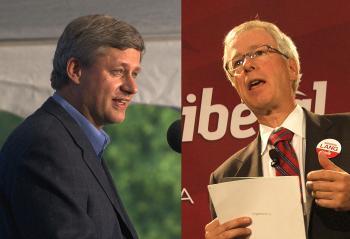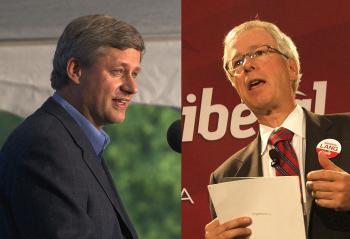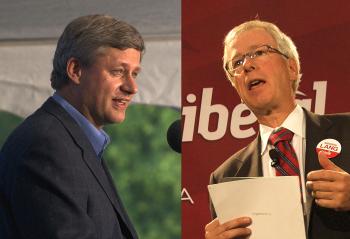You could see the Prime Minister’s love of numbers during a fire-‘em-up speech at a Conservative barbeque in Mississauga earlier this month. At no time during his rabble-rousing talk did Harper seem more sincere than when he was lauding his government’s success at cutting taxes or talking about the economy’s continued prosperity.
Of course, he couldn’t help but take a few swipes at Dion’s Green Shift, calling the carbon-tax/poverty plan a “shaft” and the like, but those digs seemed almost obligatory, something for the crowd and a necessary part of the ongoing brawl that his minority government has fought since coming to power.
Harper is a strategist, said William Johnson in his prophetic book, Stephen Harper and the Future of Canada, published just before Harper won the 2006 general election. In his political career, Johnson said Harper has “displayed the chess master’s strategic sense of how circumstances can be turned to advantage, five or six moves into the future.”
That success is now self-evident: Harper is leading one of Canada’s longest lasting minority governments. And while the semi-fixed October 2009 election date guarantees it won’t break the record, it has far outlasted the 485-day average minority lifespan.
But even at that gathering of the party faithful, you couldn’t help but notice Harper’s distance, an almost imperceptible introversion that would settle over him whenever he wasn’t at the microphone talking. He stood around for pictures and shook a hundred hands, but as so many have noted, Harper is not your regular baby-kissing, fist-pumping extroverted politician.
And while a vast chasm of ideology lies between Harper and Dion, that similarity of personality brings them much closer together.
Dion has gotten knocked around in the press for his lack of charisma, wooden demeanor and his difficulty speaking English.
At a Liberal breakfast earlier this month Dion talked about his Green Shift to a crowd of supporters in an empty movie studio in Toronto. He was more comfortable than normal, perhaps because he was preaching to the choir his vision for transforming Canada’s economy into something greener.
But despite the warm reception, Dion never became more than interesting. Like Harper, he’s not the kind of speaker that can sweep an audience into his vision. At best he’s an amicable professor who can convince you of the reasonableness of his ideas. Perhaps he is too accustomed to having a captive audience, but the PM contender never quite manages to do more than communicate.
But despite many political analysts’ thinking that fighting an election on the intricacies of the Green Shift is an uphill battle, Dion is prepared for a fight. For all his awkwardness in front of a crowd, Dion isn’t afraid to fight for a cause he believes in.
An academic drafted into politics by former PM Jean Chrétien, Dion’s political success seems almost accidental. Chrétien enlisted him to stand for the Liberals in a bi-election in Quebec shortly after Quebecers narrowly rejected secession in the 1995 Quebec Referendum.
Prior to his 1996 election, Dion was a dedicated federalist and well-published scholar at the Université de Montréal. Chrétien named him Minister of Intergovernmental Affairs, where he fought the federalist cause and earned widespread disdain in Quebec for his efforts.
When Paul Martin later named Dion environment minister, the former professor aimed to transform the environment portfolio from a social issue into a core part of Canada’s economic strategy, explains Linda Diebel in her book Stéphane Dion: Against the Current.
“Stéphane Dion’s tenure as environment minister was marked by controversy and criticisms,” wrote Diebel. Dion was left out of key economic strategy sessions between other ministers and was at odds with the auto industry. He did, however, win the respect of Green Party leader Elizabeth May.
Harper has also struggled within his party at times, having disagreed with his former boss and finding himself at odds with the more conservative members of the Reform party.
In his book, Johnson writes that when the Reform party voted against protecting homosexuals under the Human Rights Act at its biennial convention, Harper publicly protested, saying the party should not take a stand on such moral issues.
When he later disagreed with Preston Manning’s vision for the party, Harper resigned his seat as MP and only returned when it looked like the Alliance party, which succeeded the Reform party, was on the verge of breaking up.
“An unusual trait for a politician is his conviction that correct policies are more important than tactics for winning support and achieving power,” wrote Johnson. While Harper has been criticized for fierce partisanship, he is often credited for focusing on the issues he campaigned on, which many count as a mark of integrity.
Neither Dion nor Harper can claim to be a darling of the media, and much of the derision directed at the two leaders marks their differences. Harper is often accused of being cold and arrogant, while Dion is said to be awkward and indecisive.
The difference can be seen to some degree in each man’s reaction to the authors of the two books mentioned above. Dion opened his doors wide when Diebel was writing her biography of him while Harper wouldn’t give Johnson an interview. Though some would laud Dion’s accessibility, in a world of instant communication where every slip can be broadcast in moments, it is also a liability.
Harper’s aloofness may help him craft his message in the media, but it has also earned him the disdain of journalists and made it hard for Canadians to connect with him. Meanwhile Dion’s openness has made him approachable but at times damaged his election prospects and made him seem like a weak leader.
But as the prospect of an election draws ever nearer, especially since Harper started talking about calling one this fall, Canadians may find comfort in the fact that while neither leader is particularly charismatic, both are capable intellectuals focused on successful policy.
Which means that rather than a personality contest, the coming election could be more of a contest of ideas. And when the battle of the wonks finally does begin, it will be for Canadians to decide whose ideas best fit the country and the changing world we live in.







